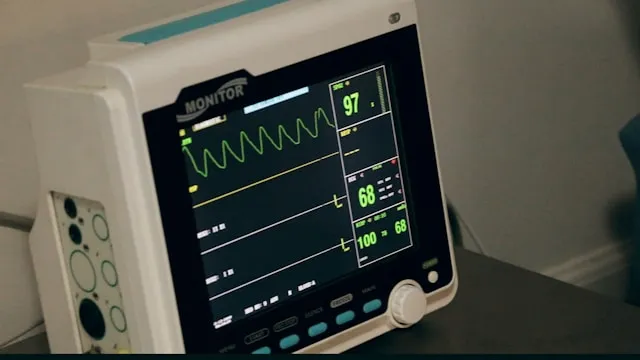MCHC stands for Mean Corpuscular Hemoglobin Concentration. It shows the amount of hemoglobin inside your red blood cells. When MCHC is low, your blood carries less oxygen to your tissues. This can lead to tiredness, weakness, and several health complications if not treated on time.
Have you ever looked at your CBC report and noticed that your MCHC value is low? If you are confused about what it means or whether it is something to worry about, you are not alone. Many people see this value highlighted in their reports and are unsure of what it actually indicates.
Let's find out what low MCHC means, why it drops, which symptoms you should pay attention to, and the most effective ways to treat it.
What Does Low MCHC Mean in a Blood Test?
MCHC measures how concentrated hemoglobin is within each red blood cell. If the value falls below 32 g/dL, it generally means your red blood cells are not filled with enough hemoglobin. Hemoglobin is the protein that carries oxygen, so lower levels affect how well your body can transport oxygen.
Low MCHC usually suggests anemia, nutritional deficiencies, or an underlying medical condition that affects red blood cell production.
|
MCHC Value |
Interpretation |
|
32–37 g/dL |
Normal |
|
30–32 g/dL |
Mildly low |
|
28–30 g/dL |
Moderate low |
|
< 28 g/dL |
Severe low / needs evaluation |
A simple way to imagine it is to think of hemoglobin as fuel. If your red blood cells are running on low fuel, they will not deliver enough oxygen to the body, which leads to fatigue and other symptoms.
Causes of Low MCHC Levels
Low MCHC can develop for many reasons. Most of them are treatable once diagnosed. Here’s a list of causes of low MCHC levels in a blood test:
1. Autoimmune Hemolytic Anemia
-
In this case, the antibodies start to attack the red blood cells. But the cause of autoimmune hemolytic anemia is unknown.
-
The destruction of red blood cells can also occur in lupus and lymphoma. As a result, you can see that the value of MCHC will fall.
2. Hereditary Spherocytosis
-
Hereditary spherocytosis starts destroying the membrane of red blood cells and leads to low levels.
-
It is a genetic mutation and doesn't need any genetic test to be done. However, blood tests and family history are sufficient to gather data.
3. Iron Deficiency Anemia
-
Anemia is a condition in which a few red blood cells are formed due to iron deficiency caused by a low iron-rich diet or the inability of the body to absorb iron.
-
When less is present for the development of RBCs, it results in smaller & paler RBCs, leading to low concentration of hemoglobin, which contributes to low MCHC levels.
4. Pernicious Anemia
-
This type of anemia is caused by a Vitamin B12-deficient diet or an inability of the body to absorb vitamin B12, which is essential for the production of BBCs.
-
When there is not enough vitamin B12, RBCs can’t carry sufficient oxygen, resulting in a reduced concentration of hemoglobin, leading to low MCHC levels.
5. Bone Marrow Defects
-
Bone marrow defects are a condition where stem cells are damaged.
-
As a result, the bone marrow is left with fewer or no cells to produce red blood cells, leading to low hemoglobin and then a low MCHC value.
6. Kidney Disease
-
Chronic renal failure or renal problems can damage the kidneys, making them produce not enough erythropoietin, which signals the production of red blood cells.
-
Consequently, there is a low red blood cell concentration, which leads to a fall in the value of MCHC.
Additional conditions that cause low MCHC values are:
-
Enlarged Spleen
-
Porphyria (inability of the body to produce heme, a crucial molecule in RBCs)
-
Thalassemia (an inherited blood disorder marked by low production of hemoglobin)
-
Vasculitis (inflammation of the blood vessels)
-
Hemolysis (premature rupture of RBCs)
-
Leukemia (blood cancer that affects bone marrow)
-
Gastrointestinal Tumors
-
Inflammatory disorders
Most causes of low MCHC relate to poor red blood cell production, nutrient deficiencies, or conditions that damage or destroy RBCs.
Common Symptoms of Low MCHC: Are You at Risk?
People with low MCHC often notice symptoms similar to anemia. These symptoms occur because the tissues are not receiving enough oxygen.
Here is a look at a few MCHC low symptoms:
-
Fatigue
-
Pale skin and gums
-
Weakness
-
Jaundice
-
Fever
-
Fainting
-
Abdominal discomfort
-
Lack of concentration
-
Fast and irregular breaths
-
Cold hands and extremities
-
Loss of stamina
-
Headache
-
Dizziness
-
Shortness of breath
-
Chest pain
-
Easy bruising
But symptoms alone aren’t enough. Here’s how doctors diagnose low MCHC accurately.
How is MCHC Diagnosed?
MCHC is diagnosed through a complete blood count (CBC) test.
Complete blood count (CBC) test:
-
This test measures the amount of hemoglobin in your red blood cells. The doctor takes a small sample of your blood, usually from a vein in your arm. The sample is then analyzed to check your MCHC levels.
-
If your MCHC is low, it could mean you have a problem with your red blood cells, such as anemia or an iron deficiency. Your doctor may recommend further tests based on the results.
Checking Iron Levels
-
Using the same blood drawn for the CBC test, the doctor may also check the body's iron levels & iron-binding capacity.
-
This helps the providers measure how well the body absorbs the iron, allowing them to determine the cause of anemia.
Other diagnostic tests:
The healthcare providers may also suggest these tests to diagnose other conditions:
-
Endoscopy: Detects ulcers and cancer in your gastrointestinal (GI) tract.
-
X-rays: Examine the presence of ulcers in your small intestine and stomach.
-
Fecal occult blood test: Detects blood in the stool.
-
Colonoscopy: Detects colon cancer or other abnormalities that cause bleeding in the colon.
-
Additional blood tests: Check for Celiac or Crohn’s disease.
How to Prepare for the MCHC Blood Test?
Before the blood test:
-
You may need to avoid eating or drinking anything if the healthcare providers order some tests.
-
Always follow what your doctor has instructed.
During the blood test:
-
You will be asked to sit and stretch your arm.
-
The provider will gently clean the injection area using an alcohol wipe.
-
Next, they will tie a rubber band above the injection site so that excess blood collects in that area from where they will take blood samples.
-
Then, they will insert a needle in the area, take blood, and collect it in a collection tube.
-
At last, the provider will put a cotton ball in the injection area to stop bleeding.
-
The procedure will take less than 5 minutes.
After the blood test:
-
The blood sample will be tested in the laboratory.
-
You can leave after the test unless you are feeling light-headed.
-
You may notice a little bruise in the injection site and soreness in your arm, but these symptoms will resolve in some time.
Understanding the Results of an MCHC Diagnosis
-
Average MCHC Levels: The typical normal MCHC value is 32-37 g/dL. This range can differ based on the type of test and technology used.
-
Low MCHC Levels: The range below 32 g/dL indicates low MCHC levels. This value helps doctors understand how well your red blood cells are working to carry oxygen. Low MCHC levels usually mean there is less hemoglobin in your red blood cells, which can lead to various health problems like:
-
Anemia or iron deficiency
-
Vitamin B12 deficiency
-
Chronic diseases affecting blood cells
-
Bone marrow issues
-
Poor nutrition
-
High MCHC Levels: Above 36 g/dL is considered high MCHC levels, which is uncommon. This value is seen in red blood cell-related disorders such as hereditary spherocytosis, hyperchromia, or sickle cell disease.
Evaluating the result, the providers can decide the best treatment for your condition.
Treatment for Low MCHC Levels
There are various ways we can manage the low MCHC levels and produce sufficient red blood cells.
1. Dietary Modifications
Modifying your diet by adding iron-rich and Vitamin B6 & B12-rich foods can help with the easy absorption of iron and the production of a large number of red blood cells.
Iron-rich foods are:
-
Beans
-
Seafood
-
Red meat
-
Pork
-
Poultry
-
Peas
-
Spinach
Vitamin B6-rich foods are:
-
Bananas
-
Wild (not farmed) tuna
-
Chicken breast
-
Salmon
-
Sweet potato
-
Spinach
Vitamin B12-rich foods are:
-
Eggs
-
Yogurt
-
Dairy
-
Turkey
2. Supplements
Supplementation plays a critical role in preventing deficiency in the body. But, before taking any supplements, take advice from the doctor about their side effects. The supplements are:
-
Vitamin B12
-
Iron tablets
-
Vitamin B6
-
Vitamin C
3. Medications
The doctor most likely advises you to use these medications:
-
Erythropoiesis-stimulating agent: Triggers the bone marrow to produce more RBCs, a study says.
-
Intravenous or IV iron therapy: Involves giving iron directly into the vein to boost the iron levels in the blood.
-
Birth control pills: Control heavy bleeding in females.
-
Prednisone and corticosteroids: Given to treat autoimmune disorders where the immune system attacks its red blood cells.
-
Injectafer: Replenishes lost iron stores, increasing iron levels quickly.
-
Vitamin B12 shots: Research reports that it treats anemia associated with vitamin B12 deficiency.
4. Blood Transfusion
If all the therapies stop working and the red blood cell destruction rate becomes faster, then the option left for severely low counts is blood transfusion.
-
Blood transfusion involves giving the donor blood intravenously to the patient, which helps provide enough RBCs, which, in turn, increases hemoglobin in the blood. This prevents severe anemia.
-
This procedure should be given under the supervision of an expert.
-
There should be correct matching of donated and received blood.
-
On top of that, 24 hours is sufficient to raise the blood. Therefore, it is quite effective for all treatments.
5. Splenectomy
-
This surgical procedure involves removing the spleen, which is considered an effective treatment when the destruction rate of RBCs becomes high due to a condition like hereditary spherocytosis.
-
Removing the spleen will cause a slight loss of red blood cells from the body, resulting in low MCHC levels.
Complications Associated with Low Levels of MCHC
As low MCHC levels are associated with certain health conditions, which, if left untreated, can lead to the following complications:
-
Lack of energy and low stamina, impacting daily activities.
-
Anemic hypoxia (the low oxygen-carrying ability of the blood).
-
Mood changes and irritability, especially in chronic cases.
-
Memory problems or difficulty concentrating.
-
Weak immune system
-
Cardiovascular problems like rapid heart rate, heart failure, or an enlarged heart.
-
Pregnancy complications such as premature birth, low birth weight, and high risk of maternal death.
-
Growth and development issues in children.
-
Osteoporosis (weak bones).
-
Increased risk of falls in the elderly.
-
Restless leg syndrome (uncontrollable urge to move the legs).
Are Cancers Associated with Low MCHC?
Yes, cancers are associated with low MCHC. The following are the types of those cancers:
-
Leukemia and Lymphoma: These are bone marrow-related cancers that affect the bone marrow, which is responsible for RBCs' production. This leads to low hemoglobin, which results in a low MCHC value.
-
Stomach and Colon Cancer: The cancers that increase the risk of bleeding, reducing hemoglobin levels in the blood. This consequently affects MCHC levels.
Awareness of these connections is important for diagnosing and managing cancer-related anemia. Early detection and treatment help manage both the cancer and the related low MCHC levels.
Tips to Prevent Low MCHC Levels
Preventing low levels of MCHC involves maintaining a healthy diet and addressing any health issues early.
-
Eat iron-rich foods like red meat and spinach.
-
Include vitamin B12 and B6 in your diet.
-
Take iron supplements if needed, but consult your doctor first.
-
Avoid excessive alcohol, which can damage red blood cells.
-
Stay hydrated to help your blood flow properly.
-
Get regular blood tests to monitor your MCHC.
-
Treat any underlying health conditions early.
-
Exercise regularly to improve circulation.
-
Reduce stress, as it can impact your overall health.
Summing Up
Low MCHC is often linked to anemia, nutrient deficiencies, or diseases that affect red blood cell production. The good news is that most causes are treatable with timely diagnosis and proper care.
If your reports show a low value or you are experiencing symptoms, it is important to consult your doctor. A healthy diet, regular checkups, and fast treatment of deficiencies can help restore normal MCHC levels and prevent complications.
Frequently Asked Questions
Is low MCHC linked to autoimmune diseases?
Yes, autoimmune diseases like lupus can cause your body to attack its own red blood cells, leading to low MCHC because red blood cells are being destroyed too fast.
Can low MCHC make physical activities harder?
Yes, low MCHC can reduce your energy because less oxygen is carried in your blood. This can make you feel weak and tired during physical activities.
Should a person be worried if their MCHC is low?
Yes, as it can indicate iron-deficiency anemia. However, in certain cases, it might point to severe health issues like cancer or celiac disease.
Can MCHC be low without anemia?
Yes, MCHC can also be low if you have other medical issues like chronic diseases, thalassemia, or lead poisoning.
Can dehydration affect MCHC?
Yes, it can make the blood highly concentrated, which negatively leads to increased MCHC levels.
What are the potential MCH and MCHC differences?
Both provide information about RBCs' characteristics but have distinct aspects. For instance, MCH measures the average amount of hemoglobin in each RBC, and MCHC represents the average concentration of hemoglobin in a given volume of RBCs.

Reviewed by







